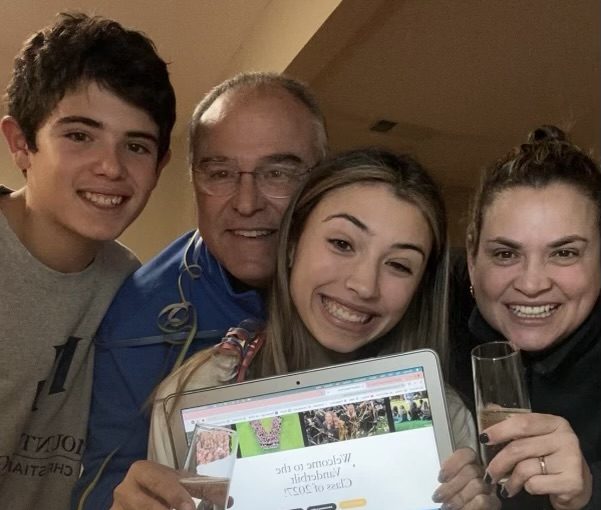During the summer before my first year of college, I already felt exhausted and misled by everyone around me. A month later, I’m just now feeling caught up.
All of my family, teachers and high school administrators told me that summer college work before my first year of college would be the most meaningful work I could do. Their enthusiasm made it sound like I would be fulfilled and ready for the college experience after completing it. I expected the summer reading and essay assignment to offer me new insight, help me solve complex problems and prepare me for a successful first year in college.
In reality, it was the worst summer I’ve ever experienced, and I wouldn’t even consider it a break from school at all.
Summer homework and paperwork
Like most students accepted to Vanderbilt, I am highly motivated and try my hardest on my schoolwork. When we were assigned by Vanderbilt to read “Creative People Must Be Stopped” by David Owens over the summer, I spent my entire break reading the book, researching important information from it that I didn’t quite understand and working on my short essay religiously. Then, I found out from upperclassmen that the essay is hardly ever taken seriously and sometimes not even mentioned in VUcept meetings.
In addition to the essay I spent too much time on, required online modules that review subjects like alcohol and diversity were assigned two weeks before they were due. While I agree that completing these modules are important to every college student, why not give us adequate time to complete the courses by assigning them earlier, to allow us to learn the information rather than rushing through it?
I told myself not to sweat and proceeded to sit down for two hours to finish one of the courses. However, when I clicked the button to finish, the site took me back to the home screen and saved none of my work. This same situation happened four more times before I finished the three modules. To say that I was frustrated would be an understatement.
I spent countless hours filling out every form that Vanderbilt sent me with the same information as the ten forms that I filled out before. I understand the importance of sharing vital information with the university, but having one, the comprehensive form would have been more efficient.
As college work started to pile up, I pushed back finding a job, telling myself that school was more important. I had wanted to work over the summer because I knew my life was about to get stressful, and I wanted to feel financially supported when I went off to college. It was a week before school started, and I still didn’t have a job, falling back on only a little money saved up. It felt like for every task I finished on my summer to-do list, two more tasks appeared.
I gave up a potential summer job, several weekend trips with my family and any chance of having fun to finish apparently insignificant pre-college work. It’s unfair that I felt that working a job over the summer to help pay for my education could have jeopardized my performance on summer homework and diligence in filling out forms.
With the mounds of paperwork, reading and preparing for college that I’ve done this summer, I can’t even imagine having to juggle other obligations, such as summer courses, with all of those obligations.
Finding a roommate
One of the worst things about the summer before college is the stress that comes with finding a roommate. There is immediate pressure to find people to whom you can talk on campus so you’re not in a strange, new place all alone.
In the process of finding a roommate, you can spend countless hours talking to someone trying to see if you are compatible as roommates—only to realize it’s not working because you’re just too different. Even worse, when I found the perfect roommate, they found someone else before I got the chance to ask them to room with me. While this series of events might sound like the plot of a college drama documentary, it’s a real feeling that creates unnecessary stress and disappointment.
Vanderbilt has a questionnaire for randomly pairing roommates together, but it just isn’t comprehensive enough. The survey only asked 10 questions about sleeping habits and studying preferences. They don’t provide an accurate and well-rounded picture of a potential roommate. Creating a platform where each student gets to choose a roommate based on more personal preference questions would be a better way to make long-lasting friends and a comfortable living experience than throwing two people in a room together that go to bed at the same time, both like to study.
Sadly enough, this situation doesn’t just happen at Vanderbilt. Several other institutions have similar processes for pairing roommates together as well as other requirements like mandatory summer homework and first-year reading.
To the Class of 2027 and beyond, I implore you to create a balance that works for you during the summer. To our administrators—while the homework and forms surely have the best of intentions, more transparency and understanding of the stress that comes with this much change would be appreciated. When Vanderbilt assigns homework for future first-year students, I urge them to either take summer reading assignments more seriously or get rid of them entirely. The university could provide a summer checklist in advance for new students to give students more time to enjoy their summer.
I sincerely hope that Vanderbilt, as well as other universities with similar practices, will consider the complications that the summer brings for incoming first-years and work diligently to create a less stressful and more enjoyable break for us all.









